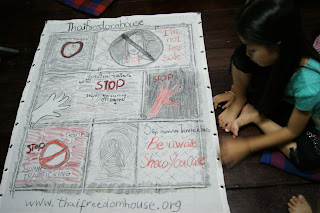On top of my age I have been on top of Bangkok! Seriously, I couldn't have imagined of a better treatment on my birthday! No massage or exquisite dinner would have been as special compared with Bangkok by night. An horyzon of sparkling lights, the breeze of the night on my face, the eternal movement of the boats on the Chao Phraya river...Time to go back home. Two months have been just the right time for a first taste of Asia: short enough not to miss anything from home, not to start routines, and long enough to get a feeling of 'how it works' over here...though not enough time to get this inscrutable folk. I rather have to say that the more time I spend here, the more I have no clue of what really is going on! Next time maybe...
*** *** ***
Un anno piu' grande e non un centimetro piu' alta, ma in alto si' ci sono andata: in cima a Bangkok! Sul serio, che regalo, non potevo immaginarmi trattamento migliore per il mio compleanno! Nessun massaggio o cena squisita avrebbe retto il paragone con la Bangkok notturna. Un orizzonte di luci sbrillucciolanti, la brezza della notte sul volto e l'eterno movimento delle barche sul fiume Chao Phraya...E' ormai ora di tornare a casa. Due mesi sono stati il periodo giusto per avere un primo assaggio di Asia: abbastanza corto da non farsi venire nostalgie di casa, da non cominciare alcuna routine, e abbastanza lungo da farsi un'idea su come funzionano qui le cose...ma comuqnue non abbastanza da capire questo inscrutabile popolo! La prossima volta magari saro' piu' preparata.






































